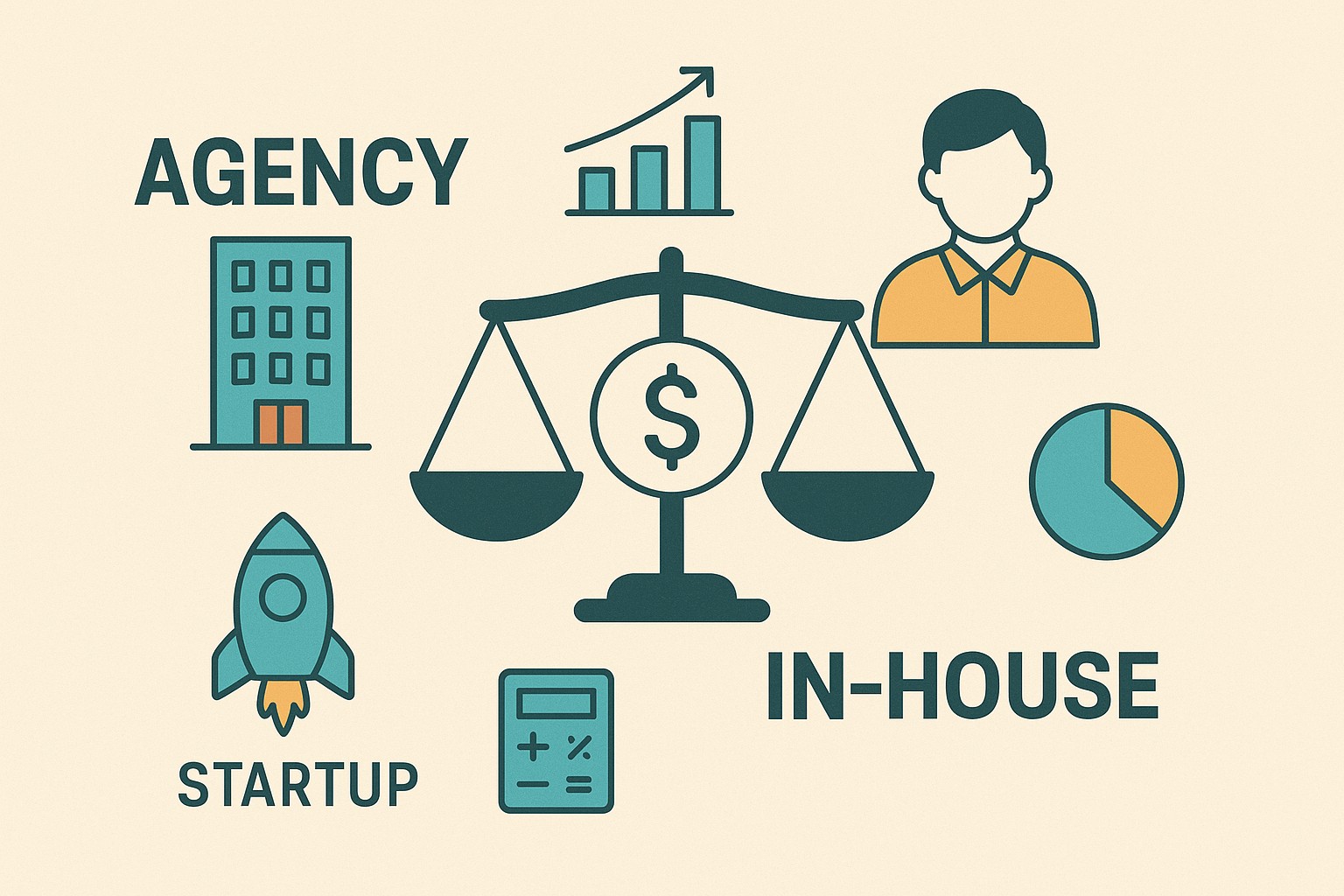Agency vs In-House Marketing Cost for Startups: Complete Breakdown for 2025

Agency vs In-House Marketing Cost for Startups: Complete Breakdown for 2025
For startup founders, deciding between hiring an agency or building an in-house marketing team is a pivotal choice that directly impacts growth, agility, and—most importantly—costs. As we enter 2025, understanding the financial implications of each approach is crucial for making data-driven decisions that maximize return on investment. In this guide, Curio Revelio, your trusted growth marketing partner, breaks down the true cost of agency vs in-house marketing for startups, helping you choose the best path for sustainable growth.
Understanding the Core Differences
Both agency and in-house marketing models offer unique advantages and challenges. The right fit depends on your startup’s stage, growth goals, and available resources.
- Agency Marketing: Outsource your digital marketing to a specialized firm. Gain access to diverse expertise and tools, often with flexible engagement models.
- In-House Marketing: Build an internal team to handle all marketing needs, gaining direct control and seamless alignment with your company culture and vision.
Cost Breakdown: Agency vs In-House Marketing in 2025
1. Agency Marketing Costs
Working with a growth marketing agency typically involves several fee structures. Let’s break down the major cost components:
- Monthly Retainers: Most agencies charge a fixed monthly fee, which can range from $3,000 to $15,000+ depending on the scope, channel coverage (SEO, PPC, social, content), and agency reputation.
- Project-Based Fees: For specific campaigns or short-term projects, agencies may offer one-time rates, from $5,000 to $50,000+ depending on complexity.
- Performance-Based Fees: Some agencies (like Curio Revelio) offer hybrid or performance-linked models, where fees are tied to KPIs such as leads, revenue, or conversions.
- Ad Spend Management: Agencies often take a percentage (typically 10-20%) of your ad spend as a management fee, in addition to the media budget.
- Tool Subscriptions: Agencies usually bundle the cost of essential marketing tools (e.g., Ahrefs, SEMrush, HubSpot, Mailchimp) into their fees, saving you direct subscription costs.
2. In-House Marketing Costs
Building and maintaining an in-house team requires a different financial commitment:
- Salaries: The most significant cost. For a lean in-house team (1 marketing manager, 1 content creator, 1 digital specialist), expect combined annual salaries of $180,000–$300,000+, depending on location and experience.
- Benefits & Overheads: Add 20-30% for benefits, taxes, workspace, and equipment.
- Recruitment & Training: Finding and onboarding talent can cost $10,000–$30,000 per hire, plus ongoing professional development.
- Marketing Tools: Direct subscriptions for SEO, analytics, automation, and CRM tools can total $1,000–$3,000/month (e.g., Google Analytics, HubSpot, Buffer, Canva).
- Ad Spend: You control the media budget, but also need expertise to optimize investments.
Agency vs In-House: Pros, Cons, and Hidden Costs
| Agency | In-House | |
|---|---|---|
| Expertise | Access to diverse, specialized talent | Limited to team’s collective experience |
| Speed & Flexibility | Quick ramp-up, adaptable to changing needs | Slower to scale or pivot, hiring takes time |
| Cost Predictability | Predictable monthly or project fees | Fixed salaries, but overheads can rise |
| Alignment & Control | May require extra onboarding to align with vision | Direct control, cultural fit |
| Tool Access | Premium tools included in fees | Direct subscription costs |
| Long-Term Value | Ideal for rapid scaling & experimentation | Best for mature, stable marketing operations |
Which Is Cheaper for Startups in 2025?
For early-stage startups, agencies typically offer a lower upfront cost and greater agility. With no need for full-time hires or expensive tool subscriptions, you can tap into expert execution and strategic direction immediately. As your startup grows and your marketing needs become more predictable, building an in-house team may offer greater long-term value and cultural integration—but at a higher initial investment.
Example Scenario: Year-One Cost Comparison
- Agency Model: $6,000/month retainer + $2,000/month ad spend management fee = $96,000/year (includes access to tools, strategic consulting, and execution)
- In-House Model: 3-person team ($210,000 salaries + $42,000 benefits) + $24,000 tool subscriptions = $276,000/year
Bottom Line: Agencies are often 2-3x more cost-effective for early growth stages, while in-house teams become cost-competitive as your marketing maturity and resource needs expand.
Hybrid Models: The Best of Both Worlds
Many fast-growing startups are now adopting hybrid approaches—combining lean in-house leadership with agency or consultancy support for specialized skills (e.g., performance marketing, advanced analytics). Fractional growth teams, like those offered by Curio Revelio, provide strategic direction and hands-on execution, without the long-term overhead of building a full team.
How Curio Revelio Maximizes Your Marketing ROI
At Curio Revelio, we help startup founders navigate the agency vs in-house decision with data-driven clarity. Our flexible engagement models—fractional teams, project sprints, and growth advisory—ensure you get the expertise you need, when you need it, with performance-linked pricing that aligns incentives for rapid growth.
Ready to optimize your marketing costs and accelerate your startup’s growth in 2025? Contact Curio Revelio for a tailored cost-benefit analysis and a scalable growth strategy that fits your unique needs.
Read More
Maximizing Startup Success: The Role of Business Growth Advisory Services
Discover how business growth advisory services can propel startups to success by providing strategic planning, digital marketing execution, and performance-driven results.
TCS's Growth and Transformation: A Comprehensive Analysis
Explore TCS's strategic growth and transformation initiatives, including revenue milestones, AI integration, and workforce evolution, shaping the future of IT services.

Understanding Growth Marketing: Strategies for Startup Success
Explore the fundamentals of growth marketing and discover strategies to drive startup success through data-driven decision-making and innovative tactics.
Schedule a Call Today
Discuss your Growth challenges

